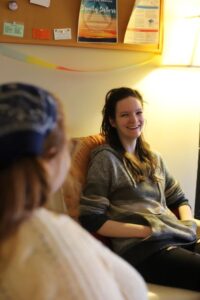 Meet Bailey Wilson – a passionate volunteer who has a vision for where she’s headed and the work she wants to do along the way. Originally from Pella, Iowa, she came to CMC as a volunteer with AmeriCorps, and serves in the Women’s Services department of CMC. Her official title is Race, Gender, and Homelessness VISTA, and she hopes her research that she is conducting in the year of her service has a lasting impact at CMC. She has been volunteering consistently since finishing college, and hopes to continue her education by experience and by pursuing graduate school.
Meet Bailey Wilson – a passionate volunteer who has a vision for where she’s headed and the work she wants to do along the way. Originally from Pella, Iowa, she came to CMC as a volunteer with AmeriCorps, and serves in the Women’s Services department of CMC. Her official title is Race, Gender, and Homelessness VISTA, and she hopes her research that she is conducting in the year of her service has a lasting impact at CMC. She has been volunteering consistently since finishing college, and hopes to continue her education by experience and by pursuing graduate school.
What was your first experience with volunteering?
Technically, it was involuntarily; I was a teenager, and a friend and I were pouring orange juice and milk for people at a pancake breakfast. Later on, after I was finished with college and during the pandemic I volunteered willingly! I volunteered with the food bank in my hometown of Pella, IA, and later with a volunteer campaign as well as with the ACLU. For me in general, it’s important to do work that aligns with my values. I was between work and college, and I needed to fill my time in a meaningful way. I found volunteering to be a good way to find fulfillment, build my resume, and stay connected.
How did you find out about the AmeriCorps program, and what drew you to this position?
I was unemployed, looking to grow my skill set and network, and volunteering to build my career path due to my interest in nonprofits. I had a friend in AmeriCorps in another state, and I was looking for a way to volunteer full-time, to be a paid volunteer. I saw it as something similar to an internship structure. I was really drawn to the social equity as well as the research aspect of the position, as I hope to pursue grad school in the future.
What are you working on currently?
In my role I’m conducting interviews with women and other gender minorities who have experienced any kind of homelessness, whether it’s living in transitional housing, doubling up, living in shelters, or completely unhoused. I’m focusing on listening to their stories; what are their needs in terms of resources? What are the gaps in the services they receive? I am focused on their voices; they know what they need and to lift up their voices and help them be heard. My work is person-centered, and driven by the community I serve.
What is your favorite thing about serving and working with the community that you do?
Being a listening ear to people, and seeing people able to speak to the gaps and shortcomings in the community. You get to see peoples’ humanity and to see them impact our work as providers. I really like hearing people express themselves so clearly and be ready to share what their needs are.
What is your hope for the long term impact of your role and work?
My hope is that providers are able to be more responsive to the needs of those they serve. I would love to see how what I’m doing within the agency impacts it, on both a small and large scale. I would love to see more agencies engaging around client feedback, for the clients to become part of the leadership, implementing change where the research shows it is necessary. I would like to see agencies able to ask for feedback anonymously about providers, what additional skill sets their providers could have that they as the client could benefit from. My hope is that [our community can] become more client-centered, and that they could share, “If I was in charge, this is how things would be.” I want to have the voices listened to and the changes to be implemented.
What surprised you about your role at CMC?
There was a lot of room within this project to redefine the scope, and a lot of freedom to define it on my own. Race, Gender, and Homelessness are very broad descriptors. I’ve been able to ask myself how we could tie in these things and narrow down the scope in a helpful way that results in capacity building.
What skills are you developing to use in your future career?
In a broader sense, communication skills. I’ve been able to better understand how to redirect, ask for what I need. I’ve been told I’m really good at boundaries. Specific to my project, I’m learning how to navigate and direct a conversation, and practice active listening. Within the interview, I’m finding out how to build rapport with a person in a short time frame, build trust, and try to make my interviewee more comfortable. I’m navigating sensitive research interview skills, and sensitive listening to focus on building that trust.
What do you hope to do after finishing your AmeriCorps term with CMC?
I would like to work with the CMC in the short term! Advocacy in service to the LGBTQ+ community, either through working with the ACLU or One Iowa is in the long term plan. I would like to leave the Midwest to pursue more education, and perhaps go into academia and research. I want the ability though to find that out and I feel like my experiences will guide me to what that looks like!

